How to Motivate Your Child in Ice Hockey
In this article, I’ll provide essential tips and strategies for motivating kids in Ice Hockey. We’ll explore how to boost their confidence, nurture a passion for the sport, and help them reach their utmost potential both on the ice and beyond. Covering everything from tapping into intrinsic motivation to developing resilience, these insights will be invaluable.
Key Takeaways:
- Motivating kids in Ice Hockey requires tailored strategies that cater to their individual needs and aspirations.
- Understanding your child’s love for hockey and what drives them can guide your approach to motivation.
- Positive reinforcement, goal-setting, and fostering a growth mindset are effective techniques to motivate young hockey players.
- Encouraging team spirit and building camaraderie with teammates enhances motivation and enjoyment of the game.
- Building confidence through pre-game rituals and instilling self-belief helps young athletes thrive in competitive play.
Understanding Your Child’s Love for Hockey
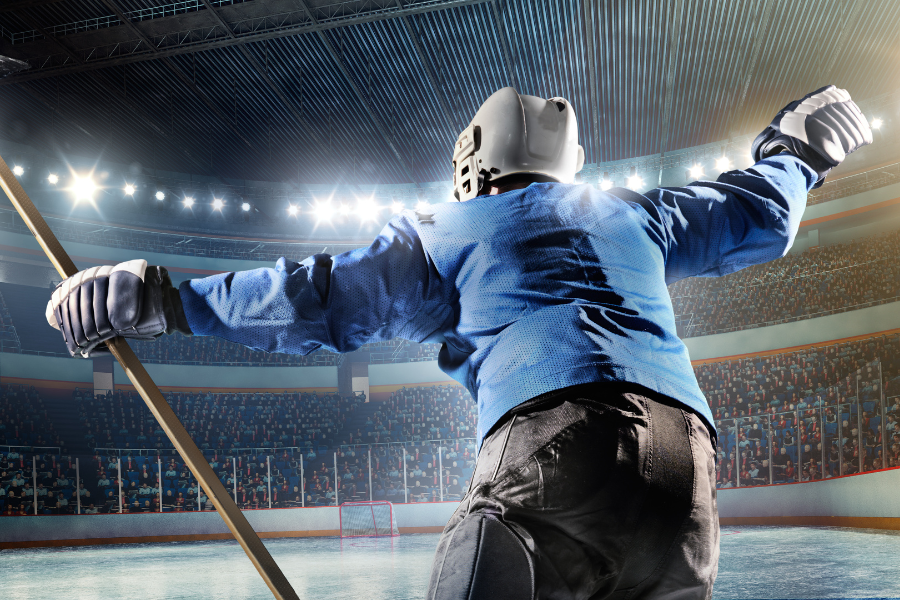
Before diving into specific strategies, it’s essential to understand your child’s love for Hockey and the factors that motivate them to participate in the sport. The psychology behind sports enjoyment plays a crucial role in their motivation and commitment. Additionally, identifying what drives your little athlete, whether it’s the thrill of competition, camaraderie with teammates, or personal goals, can guide your approach to motivate them effectively.
The Psychology Behind Sports Enjoyment
Sports motivation is influenced by various psychological factors that contribute to a child’s love for hockey. Understanding these factors can help parents in building motivation and fostering a positive sports experience for their child.
- Intrinsic Motivation: Many kids naturally gravitate towards sports such as hockey, finding genuine joy and fulfillment in the gameplay. They relish the excitement of the fast-paced action and the physical contact, even if it’s something they’ll grow into in the coming years.
- Social Interaction: Hockey provides an opportunity for children to interact and build relationships with teammates and coaches. The social aspect of the sport, such as working together as a team and forming friendships, can only enhance their love for a sport. Plus, don’t forget the power of team camaraderie and that sense of belonging; they’re vital psychological motivators in the game!
- Challenge and Achievement: Hockey presents a challenge for young athletes, and overcoming these challenges can be highly rewarding for certain individuals. They are driven by setting goals and seeing a challenge before them. They receive a sense of achievement they feel when improving their skills and accomplishing goals contributes to their enjoyment of the sport.
Identifying What Drives Your Little Athlete
Each child is unique, and their motivation in hockey may be driven by different factors. By identifying what drives your unique individual athlete, you can tailor your approach and support their passion for the game.
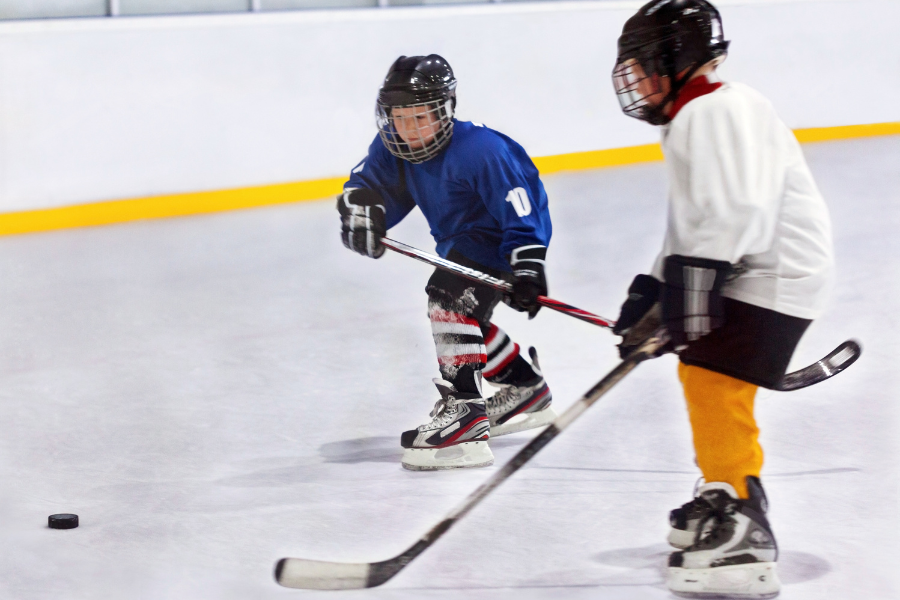
As mentioned above, some a driven by competition, and others find this extremely stressful and overwhelming.
Strategies to Motivate Your Child in Hockey
When it comes to motivating your child in Ice Hockey, several strategies can make a significant impact on their motivation and ultimately, their performance.
By implementing these strategies, you can create a positive and motivating environment for your child in ice hockey. Remember, building confidence, setting goals, and fostering a love for the game are all key factors in motivating young hockey players to reach their full potential.
Here are some tips and techniques for parents to ensure their child thrives in the sport:
- Provide constructive feedback: Don’t shy away from communicating with your child about their progress and areas for improvement. Offer specific, positive feedback to acknowledge their efforts and motivate them to continue working hard. This is not a pressured speech in any way, but gentle guidance toward correction – so they can feel successful!
- Set achievable goals: Sit down with your child and help them set realistic short-term and long-term goals. This will give them something to strive for and a sense of purpose in their hockey journey.
- Create a supportive environment: Foster an atmosphere of positivity and encouragement! Celebrate their successes, no matter how small, and focus on their growth and development rather than the outcome of each game.
- Encourage their passion for the game: Take the time to understand what makes your child love ice hockey. Whether it’s the thrill of competition, the camaraderie with teammates, or the joy of learning new skills, encourage and nurture their passion for the sport. Leverage this!
- Allow them to have fun: Remember that at its core, ice hockey is a game meant to be enjoyed. Encourage your child to have fun on the ice and remind them that their love for the game is what truly matters.
The Importance of Positive Reinforcement
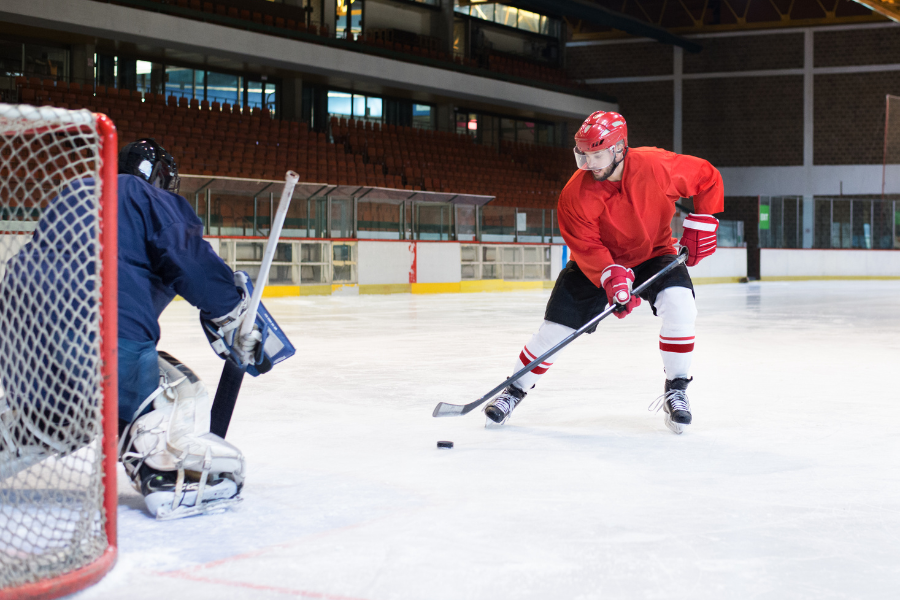
Positive reinforcement is a powerful tool for motivating young athletes in any sport, including ice hockey. Positivity brews positivity!
It not only boosts their confidence but also encourages them to strive for excellence.
In youth hockey, celebrating small wins together is a key aspect of positive reinforcement.
I can’t stress this enough: When we recognize their hard work and improvements, we can inspire young hockey players to feel accomplished and proud.
Celebrating Small Wins Together
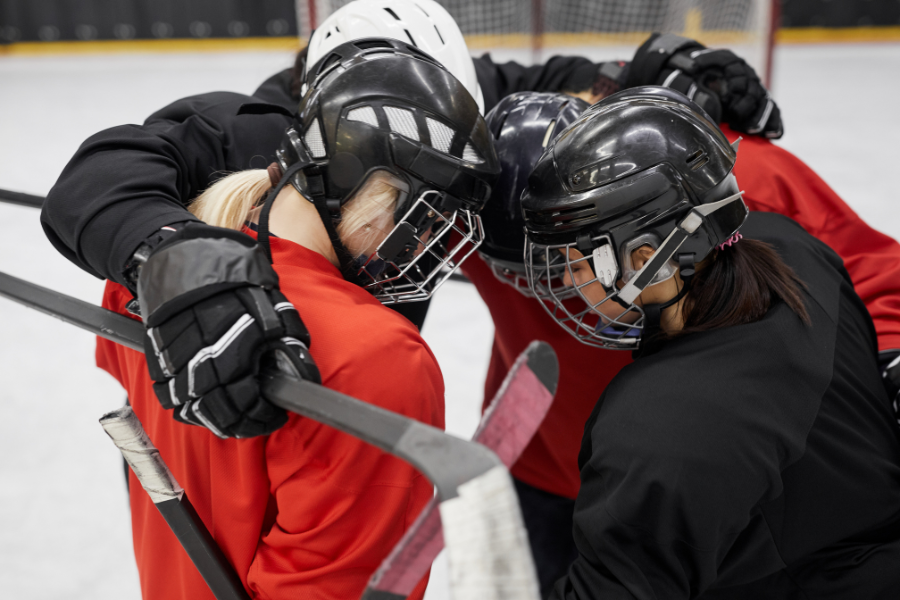
Whether it’s scoring their first goal, making a great pass, or showing improvement in their skills, these achievements should be acknowledged and celebrated. Go for some Hot Chocolate or Ice Cream! Make it a special celly!
By doing so, we not only boost their confidence but also reinforce their love for the game. It creates a positive environment where they feel valued and motivated to continue working hard. And it creates special memories.
Here are some ways to celebrate small wins together:
- Create a dedicated place to celebrate achievements. Whenever my little one wanted to mark a victory, we’d head to Cracker Barrel after a morning game. It became our cherished tradition.
- Create a team tradition: Establish a team tradition where the player of the game is recognized and celebrated after each match or practice. This can be a small token of appreciation or recognition, such as a high-five from teammates or wearing a special jersey for the next practice.
- Organize team-building activities: Plan team-building activities outside of the rink to celebrate milestones and achievements. This could include team dinners, bowling nights, or fun outings where players can bond and enjoy each other’s company.
Giving Constructive Feedback
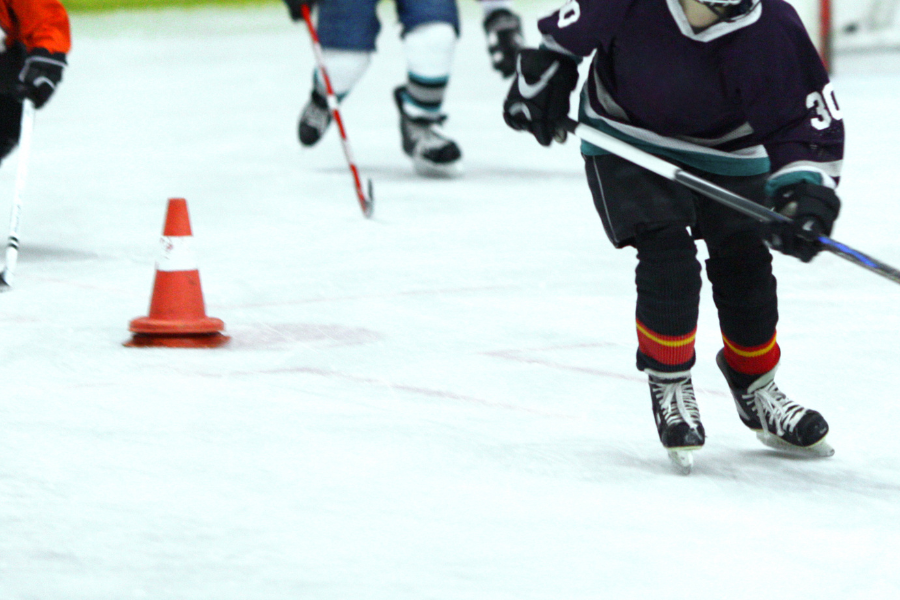
While celebrating achievements is important, giving constructive feedback is equally crucial for the growth and development of young hockey players.
Constructive feedback helps them understand areas for improvement and guides them in their journey towards excellence. They don’t always receive this type of correction from coaches, because they have 15-20 kids to coach.
However, it’s essential to give feedback in a supportive and constructive manner, focusing on their progress rather than criticizing their mistakes.
Here are some tips for giving constructive feedback to young athletes:
- Be specific: Provide specific feedback about the skills or techniques they need to work on. Focus on one or two areas at a time to avoid overwhelming them.
- Use the sandwich technique: Begin and end with positive feedback, sandwiching the areas for improvement in between. This approach helps maintain their motivation and self-confidence while addressing areas that require attention.
- Offer guidance and resources: Provide resources such as tutorials, videos, or practice drills that can help players improve their skills. Offer guidance and support as they work towards their goals.
- YouTube is awesome for this! Consider these creators below:
- Coach Jeremy: https://www.youtube.com/@CoachJeremy
- iTrain Hockey: https://www.youtube.com/@itrainhockey
- Hockey Training: https://www.youtube.com/@hockeytraining
- USA Hockey Training: https://www.youtube.com/@usahockey
Be Realistic with Goals for Your Child
Setting goals is an essential aspect of motivating kids in ice hockey and helping them grow both on and off the ice. By establishing realistic and attainable goals with your child, you can provide them with a sense of purpose and direction in their hockey journey. In this section, we will explore effective goal-setting strategies that can benefit your child’s development.
Short-Term and FUN Objectives for Continuous Improvement
Short-term objectives play a crucial role in motivating young hockey players and maintaining their enthusiasm for the sport. These goals should be focused on continuous improvement and skill development.
By setting short-term objectives, such as improving stick handling or increasing skating speed, you can help your child track their progress and celebrate their achievements along the way.
Encouraging Team Spirit and Camaraderie
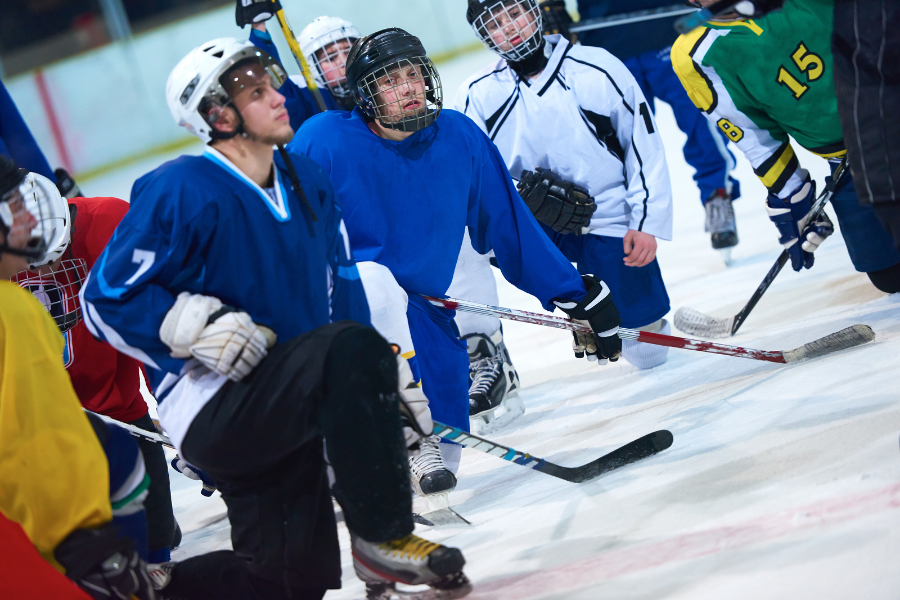
Ice hockey is not just an individual sport; it thrives on teamwork and camaraderie.
Building a strong sense of team spirit and fostering positive relationships among young hockey players is crucial for their motivation and enjoyment of the game and the future of the hockey organization itself.
Here are some practical ways to inspire team spirit and build camaraderie in youth hockey:
- Organize team-building activities: Plan fun activities outside of regular hockey practices and games to encourage bonding among teammates. This could include team outings, group workouts, or even volunteering together in the community.
- Promote open communication: Emphasize the importance of effective communication and encourage players to voice their thoughts and ideas. Create a safe and supportive environment where everyone feels heard and valued.
- Encourage teamwork on and off the ice: Teach young players the value of supporting one another both during games and in their daily lives. Emphasize that success is a collective effort and encourage them to celebrate each other’s achievements.
- Lead by example: Coaches and parents play a vital role in fostering team spirit. Set a positive example by showing respect for opponents, referees, and teammates. Encourage players to support each other and demonstrate good sportsmanship at all times.
- Create a team identity: Develop a team name, logo, or motto that represents the values and goals of the group. Encourage players to take pride in being part of the team and to work together towards a common purpose. One coach my son had would have a secret motto on the back of their practice jersey. It was super fun to know it was secret from the other players in the organization.
By implementing these strategies, you can inspire team spirit and foster camaraderie among young hockey players. Building teamwork not only enhances their motivation and enjoyment of the game but also teaches valuable life skills that extend beyond the ice.
Fostering a Growth Mindset in Young Athletes
A growth mindset is essential for fostering long-term motivation and resilience in young athletes, especially in the demanding world of sports.
By cultivating a growth mindset, we can help young hockey players develop a positive and resilient attitude towards challenges, setbacks, and continuous improvement.
Emphasizing Effort Over Outcome for Older Kiddos
When it comes to fostering a growth mindset in youth hockey, it’s essential to shift the focus away from solely fixating on outcomes and results as the athlete gets older. We should emphasize the importance of effort and the process of improvement. By highlighting the effort that goes into practicing, training, and learning new skills, we teach young athletes the value of hard work and perseverance. This mindset shift helps them understand that progress and growth come from dedication, practice, and a willingness to push beyond their comfort zones.
Encourage your child to set goals and celebrate their progress and achievements along the way, regardless of the outcome of a game or competition. By acknowledging their effort, you reinforce the idea that their hard work and dedication matter more than winning or losing. This approach not only fosters intrinsic motivation but also helps young athletes develop a sense of pride and fulfillment in their personal growth.
Teaching Resilience After Setbacks
In sports, setbacks are inevitable. Whether it’s losing a game, making mistakes on the ice, or facing tough competition, setbacks provide valuable opportunities for learning and growth. As parents, coaches, and mentors, it’s crucial to teach young athletes how to bounce back from setbacks and develop resilience.
Help your child understand that setbacks are an essential part of the learning process and that they should not be discouraged by temporary failures or setbacks. Encourage them to view setbacks as learning experiences and opportunities for improvement. Teach them to analyze what went wrong, identify areas for growth, and develop strategies to overcome obstacles.
Support your child emotionally and provide them with constructive feedback and guidance. Focus on their effort, progress, and the lessons they can learn from setbacks, rather than dwelling on the negative aspects. By teaching resilience and a growth mindset in the face of difficulties, you empower young athletes to grow, learn, and thrive both on and off the ice.
Instilling Self-Belief Through Practice
Consistent practice is essential for skill development and building confidence in young athletes. Encourage your child to engage in regular practice sessions, both on and off the ice, to hone their skills and improve their performance. By setting achievable goals and providing positive reinforcement for their efforts, you can instill a sense of self-belief in your child. Remind them of their progress and achievements, no matter how small, and highlight their strengths. This will foster a positive mindset and enhance their confidence in their abilities.
Building confidence in young hockey players requires a holistic approach that focuses on both the mental and physical aspects of the game. By incorporating pre-game rituals to enhance focus and mindset and instilling self-belief through consistent practice and positive reinforcement, you can help your child develop the confidence they need to excel both on and off the ice.
Navigating the Challenges of Competitive Play
Keeping Hockey Fun in the Face of Competition
Competitive play in ice hockey can be intense and challenging for young athletes. As a parent, it’s important to remember that maintaining a sense of fun and enjoyment is key to keeping your child motivated and engaged in the sport. Encourage them to focus on the excitement of the game, the camaraderie with teammates, and the thrill of improving their skills.
One way to keep hockey fun is to create a positive and supportive environment both on and off the ice. Avoid placing undue pressure on your child to constantly win or achieve specific outcomes. Instead, emphasize the importance of effort, sportsmanship, and personal growth. Help them understand that setbacks and losses are part of the learning process and an opportunity to improve.
Supporting Your Child Through Wins and Losses
Winning and losing are inevitable in competitive sports like ice hockey. As a parent, your role is crucial in shaping your child’s experience and mindset towards both victories and setbacks. Celebrate their achievements and successes, no matter how big or small, to reinforce their self-belief and motivation. Similarly, provides comfort and reassurance during difficult times and helps them process their emotions after losses.
Encourage open communication with your child about their feelings and experiences in the game. Listen attentively and validate their emotions, while also providing guidance and perspective. Let them know that you are there to support and encourage them, regardless of the outcome. Together, you can navigate the challenges of competitive play and help them develop the resilience and motivation needed to succeed in ice hockey and beyond.
FAQ
How can I motivate my child in ice hockey?
Motivating your child in ice hockey requires a combination of strategies that cater to their individual needs and aspirations. Some effective techniques include providing constructive feedback, setting achievable goals, fostering a supportive environment, and celebrating their progress and achievements.
What should I know about my child’s love for hockey?
Understanding your child’s love for hockey involves recognizing the psychology behind their enjoyment of the sport and identifying what drives them to participate. This knowledge will guide your approach to motivating and supporting them in their hockey journey.
How do I effectively motivate my child in ice hockey?
To effectively motivate your child in ice hockey, you can employ various strategies such as positive reinforcement, goal-setting, fostering team spirit and camaraderie, encouraging a growth mindset, and building their confidence both on and off the ice. Tailoring your approach to their individual needs and aspirations is key.
How can I provide positive reinforcement for my child in ice hockey?
Positive reinforcement is a powerful tool in motivating young athletes. You can provide positive reinforcement by celebrating small wins together, acknowledging their efforts and progress, and giving constructive feedback in a supportive manner.
What role do goals play in motivating young hockey players?
Goals are crucial in motivating young hockey players as they provide direction and a sense of purpose. By setting realistic short-term objectives for continuous improvement and long-term ambitions to fuel their passion, parents can help their child stay motivated and focused on their hockey journey.
How can I inspire team spirit and camaraderie among young hockey players?
Inspiring team spirit and fostering camaraderie among young hockey players involves encouraging positive interactions, organizing team-building activities, promoting a supportive and inclusive environment, and emphasizing the importance of teamwork and communication.
How can I foster a growth mindset in my child?
You can foster a growth mindset in your child by emphasizing effort over outcome, teaching them to embrace challenges as opportunities for growth, and helping them develop resilience and a positive attitude towards setbacks.
How do I build confidence in my young hockey player?
Building confidence in young hockey players involves incorporating pre-game rituals to enhance focus and mindset, providing consistent practice opportunities, encouraging reflection, and offering positive reinforcement and support. Instilling self-belief is also crucial for building confidence.
How do I navigate the challenges of competitive play in hockey?
Navigating the challenges of competitive play in hockey requires keeping the sport fun and maintaining a healthy perspective on competition. It also involves supporting your child through wins and losses, helping them learn from their experiences, and encouraging them to set personal goals and focus on their own development rather than comparing themselves to others.




